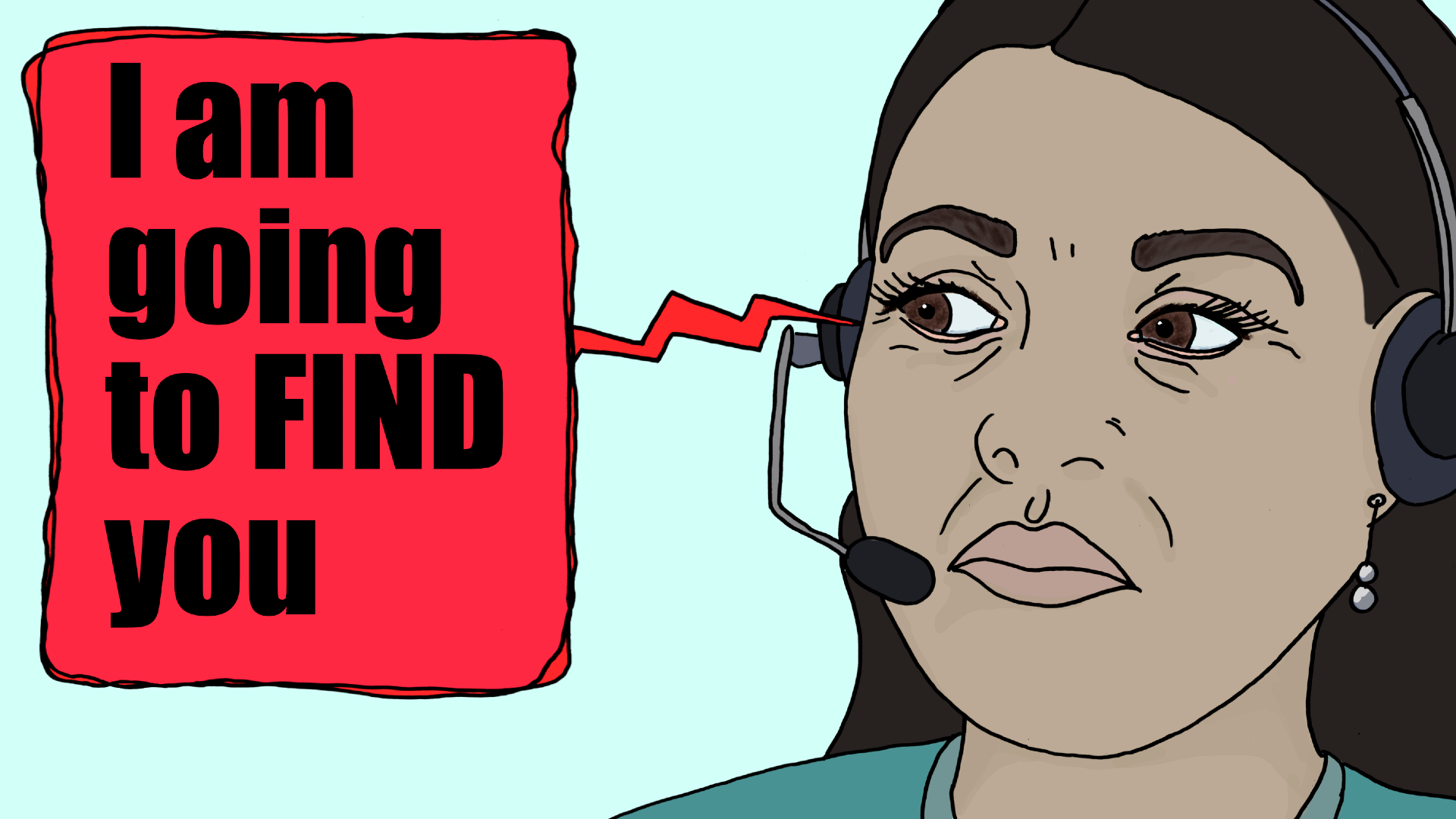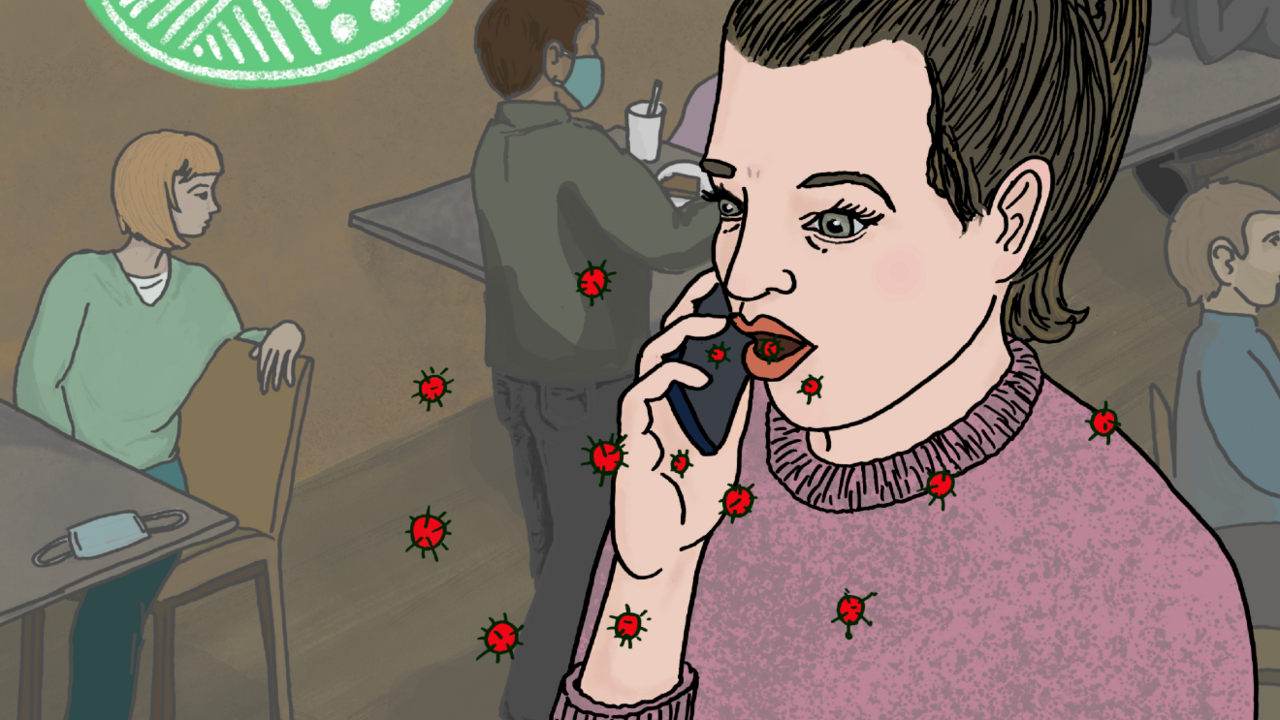Contact tracer: 'People threaten us and block our calls'
- Published

The test and trace system in England has come in for a lot of flak, not only for being slow to get started, but also for failing to trace a large proportion of the contacts of people who receive a positive Covid test. As many have noted, the system turned out not to be "world-beating" after all. But one contact tracer argues here that the public has so far escaped its share of the blame.
I want to speak out about NHS Test and Trace due to my increasing frustration with the public's lack of co-operation with the system.
There is much media criticism and while a lot of it may be justified, it isn't particularly helpful as it deflects attention from the very real problem of lack of public engagement - the negative narrative around Test and Trace simply enables people to justify their selfish behaviour.
I would say 70% of calls I have made go unanswered. It shocks and angers me that so many people just don't care.
In my normal day job I'm a front-line NHS nurse in an acute hospital but since July I've also been working as a clinical case worker for NHS Test and Trace, to earn extra money because my partner's business had to close.
My role is to call people who have tested positive for Covid to collect information, offer support and advice, and identify other individuals at risk of catching and spreading the virus.

What contact tracers do
The process begins with someone taking a Covid test. Results are sent via text or email, and if positive, the individual is invited to fill in the NHS Test and Trace form, asking for details of contacts. These contacts are then called by case workers and told how long they need to isolate.
If the Test and Trace form is not filled in, a reminder is sent after eight hours. If there is still no response, or if only a landline number has been provided, then the person with a positive test result is called by a case worker, who asks for information about the person's contacts.
Some case workers focus particularly on complicated cases, such as those involving care homes, schools and hospital staff.

In all honesty, I have been shocked and disgusted by my experience.
The most common negative experiences include frustration at unanswered calls, calls going to voicemail repeatedly, calls being blocked, phones being slammed down when you introduce yourself, and sometimes an unpleasant attitude when the call does get answered. People are called 10 or even 15 times before they are marked as a failed follow-up. Every unsuccessful call has to be documented, further wasting our time.
Very few people could genuinely think it's a scam. When a call goes to voicemail we leave a message explaining that we are from Test and Trace, giving the number we are calling from and asking the individual to look out for calls from that number. They are also invited to check this information on the gov.uk website.
When someone has actually answered the phone, I've had a few shocking exchanges.

For example, when I asked one person to go through the questions with me, the answer was: "Oh I can't just now - because I'm in Starbucks." Now, this person has had a positive test and should be isolating. They've had a text telling them they are Covid-positive, yet they are still out in Starbucks infecting other people!
Some downright refuse to give details of their contacts. Others are unavailable because, despite their positive test result, they have gone to work. One person I spoke to had tested positive after losing her sense of smell and taste, and she carried on going to work anyway, as she felt OK. She worked as a hairdresser... Let that sink in.
A middle-aged man who should have been isolating at home was out several times when I called. A young girl pretended, rather badly, to be him.
More disturbing has been the abuse I have received down the phone: people shouting, "How dare you call me? This is all a scam!" Some people have objected, for some reason, to the "tone" of the voicemail messages they have received, or expressed anger about the number of calls. Worse still are threats, such as, "I'm going to come and find you and sort you out." No-one deserves abuse for trying to do their job. It seems that more and more people are denying the seriousness of the current situation - just because they weren't very ill they decide it's a hoax.
Such responses are disheartening and also frightening. People seem so utterly selfish and entitled - so much so that I sometimes feel I no longer want to work as a case worker, and maybe not even as a nurse. I think I've had enough of people. I have, it's true, spoken to a small number of lovely, helpful people but these have sadly been few and far between.

'Trust is near zero'
Three other test and trace staff who contacted the BBC corroborated the picture painted by the author of this article. They added:
"The system's improved. There are fewer people getting called 80 times. But we still have people not wanting to engage. A woman I called at 10:30 on a Sunday morning said she wanted compensation from the NHS for being called so early."
"The idea that the service touted as 'world-beating' is actually a complete mess has an all too poisonous effect. Trust is near zero. Why would people agree to comply with a system which may appear to be a complete failure?"
"I've had people answer the phone and say they cannot talk because they are at work or members of a household answer a landline and tell me the person I need to speak to isn't there. This has become less common now, in my experience - but the number of people simply not answering the phone has risen."

I'm not trying to suggest that Test and Trace is perfect. The training for my role could certainly have been better; when you train for NHS 111 you get an opportunity to practise with mock and scenario calls, which would have been very useful with Test and Trace, to get to grips with the various software programs. I find that every week brings changes to the systems and procedures and it can be difficult to keep up - but this is a constantly changing situation so it is hard to know whether this criticism is justifiable.
I have a low opinion of the government's handling of this pandemic - some terrible decisions have been taken. And when it comes to test and trace the lack of public engagement has not been helped by the likes of Dominic Cummings, Stanley Johnson and Margaret Ferrier. But the public has a huge role to play in making this work.
I'd like to know why an individual goes to the trouble and discomfort of getting tested, if they are not going to engage with the follow-up? Test and Trace needed the public to work with and support it for it to have real impact. It doesn't matter how effective a system is if people won't pick up the phone.
A Department of Health and Social Care representative said: "In five months we have built the largest diagnostics network in UK history from scratch, informing millions of people whether they have Covid-19 and whether they should self-isolate. More than 43 million tests have been carried out and more than three million people in England have been contacted and notified to self-isolate.
"Turnaround times have been steadily improving over recent weeks and improvements to the contact tracing website, and to the process for contacting household members, have led to substantial improvements in the number of contacts reached."
Illustrations by Emma Russell, external
The author, who contacted Simon Maybin from More or Less on BBC Radio 4 with this story, wishes to remain anonymous.
You may also be interested in:

While one Covid vaccine has been approved for use in the UK and two are awaiting approval, many more are still being tested. The UK has pre-ordered 60 million doses of the Novavax vaccine, which is currently undergoing phase three trials. Dr John Wright of Bradford Royal Infirmary talked to one man about the personal tragedy that prompted him to volunteer for the injection.
'Covid killed my wife, so I'm taking part in a vaccine trial'